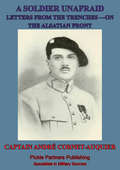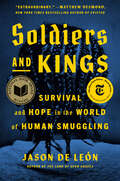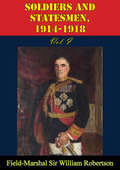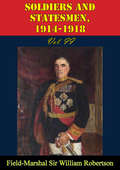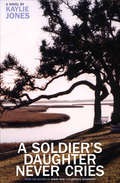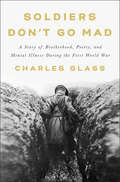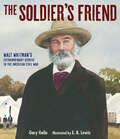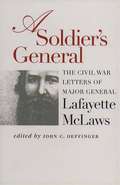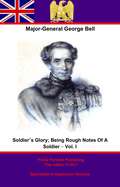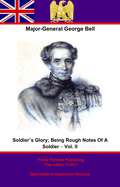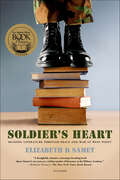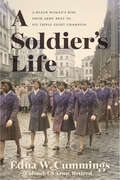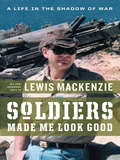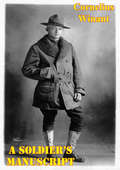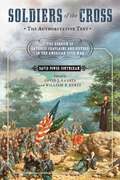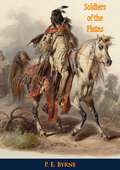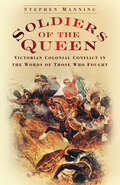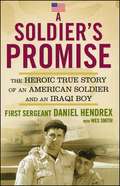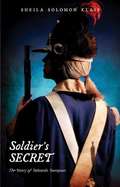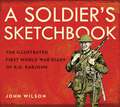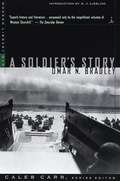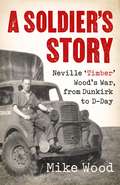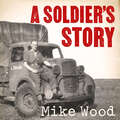- Table View
- List View
A Soldier Unafraid - Letters From The Trenches On The Alsatian Front
by Captain André Cornet-Auquier Theodore StantonNearly 1.7 million French soldiers died in the First World War fighting for their homeland against the invading German Armies; it is difficult to comprehend that hecatomb. It is indeed difficult to comprehend that many lost lives, perhaps the only way to do so is in representative figures such as the Unknown Soldier or by the many memoirs and diaries that have been left behind. One such diary is that of Captain André Cornet-Auquier, a passionate but moral man, well-known for his leadership skills in and bravery on the battlefield. The conditions in which he served on the Alsace front were always tough, being often within forty-five yards of the enemy's front lines, his faith in his cause and God sustained him even in the most trying situations. Despite being in the front line fighting for so long his luck ran out in February 1916, mortally wounded by a shell splinter. A symbol of French stoicism and courage he died beloved by his men, one of his sergeants said "It is not a spectacle often witnessed, -- that of soldiers, accustomed to face death, weeping like children as they stood round his bier."
Soldiers and Kings: Survival and Hope in the World of Human Smuggling
by Jason De León&“A work of extraordinary reportage and compassion...[it] will shock you, move you, and leave you changed.&”—Matthew Desmond, Pulitzer Prize-winning and New York Times bestselling author of Evicted and Poverty, by America&“An enlightening, frightening, unforgettable read.&”—Sandra Cisneros, bestselling author of The House on Mango StreetAn intense, intimate and first-of-its-kind look at the world of human smuggling in Latin America, by a MacArthur "genius" grant winner and anthropologist with unprecedented accessPolitical instability, poverty, climate change, and the insatiable appetite for cheap labor all fuel clandestine movement across borders. As those borders harden, the demand for smugglers who aid migrants across them increases every year. Yet the real lives and work of smugglers—or coyotes, or guides, as they are often known by the migrants who hire their services—are only ever reported on from a distance, using tired tropes and stereotypes, often depicted as boogie men and violent warlords. In an effort to better understand this essential yet extralegal billion dollar global industry, internationally recognized anthropologist and expert Jason De León embedded with a group of smugglers moving migrants across Mexico over the course of seven years.The result of this unique and extraordinary access is SOLDIERS AND KINGS: the first ever in-depth, character-driven look at human smuggling. It is a heart-wrenching and intimate narrative that revolves around the life and death of one coyote who falls in love and tries to leave smuggling behind. In a powerful, original voice, De León expertly chronicles the lives of low-level foot soldiers breaking into the smuggling game, and morally conflicted gang leaders who oversee rag-tag crews of guides and informants along the migrant trail. SOLDIERS AND KINGS is not only a ground-breaking up-close glimpse of a difficult-to-access world, it is a masterpiece of narrative nonfiction.
Soldiers And Statesmen, 1914-1918 Vol. I (Soldiers And Statesmen, 1914-1918 #1)
by Field-Marshal Sir William RobertsonSir William "Wully" Robertson was the first (and only) man to rise from the lowliest rank of private soldier to the highest rank of Field Marshal within the British Army. Determined, strong-willed and militarily conservative he served ably in field and staff positions in India and South Africa; always chary of wasting his men's lives. When the First World War broke out he sailed with the BEF in 1914 as quartermaster-general but was promoted to the post of chief of the Imperial General Staff in 1915. A staunch "westerner" who believed that the war could only be won in France and Flanders by knocking the German army out of the war, he faced many amateur strategists who wanted to squander resources in other theatres. By 1918 he resigned his post in disgust at the policies of David Lloyd George who refused to reinforce Sir Douglas Haig in France precipitating the German breakthroughs of the spring and summer.From the very start of the war Robertson was at the hub of the action at the highest levels of the British war effort; in these two volumes he reveals the decisions and struggles that shaped that strategy. Filled with the opinion of the "westerner" school of thought; through the pages Robertson despairs at the Gallipoli invasion, sets against the Salonika disaster and fumes at the civilian members of the war cabinet and the "Supreme War Council". Written a short time after the war with it all fresh and even with some bad feeling in mind these two volumes are essential to the History of the First World War.
Soldiers And Statesmen, 1914-1918 Vol. II (Soldiers And Statesmen, 1914-1918 #2)
by Field-Marshal Sir William RobertsonSir William "Wully" Robertson was the first man to rise from the lowliest rank of private soldier to the highest rank of Field Marshal within the British Army. Determined, strong-willed and militarily conservative he served ably in field and staff positions in India and South Africa; always chary of wasting his men's lives. When the First World War broke out he sailed with the BEF in 1914 as quartermaster-general but was promoted to the post of chief of the Imperial General Staff in 1915. A staunch "westerner" who believed that the war could only be won in France and Flanders by knocking the German army out of the war, he faced many amateur strategists who wanted to squander resources in other theatres. By 1918 he resigned his post in disgust at the policies of David Lloyd George who refused to reinforce Sir Douglas Haig in France precipitating the German breakthroughs of the spring and summer.From the very start of the war Robertson was at the hub of the action at the highest levels of the British war effort; in these two volumes he reveals the decisions and struggles that shaped that strategy. Filled with the opinion of the "westerner" school of thought; through the pages Robertson despairs at the Gallipoli invasion, sets against the Salonika disaster and fumes at the civilian members of the war cabinet and the "Supreme War Council". Written a short time after the war with it all fresh and even with some bad feeling in mind these two volumes are essential to the History of the First World War.
A Soldier's Daughter Never Cries: A Novel
by Kaylie JonesEvery page is a joy."--Sue Harrison, Self Magazine". . . discerning, brightly written . . . Highly recommended."--Library JournalWith a brand new author's introduction and a previously unpublished chapter. The inspiration for the Merchant Ivory film starring Kris Kristofferson and Barbara Hershey, a rich and poignant family story from the daughter of novelist James Jones (From Here to Eternity). Based on the author's early years in Paris with her famous father.
Soldiers Don't Go Mad: A Story of Brotherhood, Poetry, and Mental Illness During the First World War
by Charles GlassA brilliant and poignant history of the friendship between two great war poets, Siegfried Sassoon and Wilfred Owen, alongside a narrative investigation of the origins of PTSD and the literary response to World War IFrom the moment war broke out across Europe in 1914, the world entered a new, unparalleled era of modern warfare. Soldiers faced relentless machine gun shelling, incredible artillery power, flame throwers, and gas attacks. Within the first four months of the war, the British Army recorded the nervous collapse of ten percent of its officers; the loss of such manpower to mental illness – not to mention death and physical wounds – left the army unable to fill its ranks. Second Lieutenant Wilfred Owen was twenty-four years old when he was admitted to the newly established Craiglockhart War Hospital for treatment of shell shock. A bourgeoning poet, trying to make sense of the terror he had witnessed, he read a collection of poems from a fellow officer, Siegfried Sassoon, and was impressed by his portrayal of the soldier&’s plight. One month later, Sassoon himself arrived at Craiglockhart, having refused to return to the front after being wounded during battle.Though Owen and Sassoon differed in age, class, education, and interests, both were outsiders – as soldiers unfit to fight, as gay men in a homophobic country, and as Britons unwilling to support a war likely to wipe out an entire generation of young men. But more than anything else, they shared a love of the English language, and its highest expression of poetry. As their friendship evolved over their months as patients at Craiglockhart, each encouraged the other in their work, in their personal reckonings with the morality of war, as well as in their treatment. Therapy provided Owen, Sassoon, and fellow patients with insights that allowed them express themselves better, and for the 28 months that Craiglockhart was in operation, it notably incubated the era&’s most significant developments in both psychiatry and poetry.Drawing on rich source materials, as well as Glass&’s own deep understanding of trauma and war, Soldiers Don't Go Mad tells for the first time the story of the soldiers and doctors who struggled with the effects of industrial warfare on the human psyche. Writing beyond the battlefields, to the psychiatric couch of Craiglockhart but also the literary salons, halls of power, and country houses, Glass charts the experiences of Owen and Sassoon, and of their fellow soldier-poets, alongside the greater literary response to modern warfare. As he investigates the roots of what we now know as post-traumatic stress disorder, Glass brings historical bearing to how we must consider war&’s ravaging effects on mental health, and the ways in which creative work helps us come to terms with even the darkest of times.
The Soldier's Friend: Walt Whitman's Extraordinary Service in the American Civil War
by Gary GolioWalt Whitman is celebrated as an iconic American poet, but few know of the crucial and heroic role he played tending to the wounded and dying in Civil War hospitals. This nonfiction picture book highlights Whitman&’s compassion and teaches an important lesson about empathy, making this a perfect social-emotional learning title for young readers.In December of 1862, Walt Whitman left Brooklyn, New York, for the war-torn South after seeing his brother's name on a list of wounded Union soldiers. What he found on the battlefields completely changed his life, as he came face to face with not only the wounded, but the dying. Whitman spent the next three years working part-time in Washington, DC, visiting and ministering to soldiers in the city&’s many military hospitals. Caring for the sick and dying was not easy, but Whitman was committed to his chosen service. He became known as "the soldiers&’ friend," and was bound—in his own way—to save and heal the America he wrote about and loved so deeply.New York Times-bestselling author Gary Golio and Caldecott Honor artist E. B. Lewis bring Whitman&’s story and his passion for America to life, complete with quotes from Whitman&’s works, and extensive backmatter, which includes a bibliography and photographs.
A Soldier's General
by John C. OeffingerDuring his service in the Confederate army, Major General Lafayette McLaws (1821-1897) served under and alongside such famous officers as Robert E. Lee, Joseph E. Johnston, James Longstreet, and John B. Hood. He played a significant role in some of the most crucial battles of the Civil War, including Harpers Ferry, Antietam, Fredericksburg, Chancellorsville, and Gettysburg. Despite this, no biography of McLaws or history of his division has ever been published.A Soldier's General gathers ninety-five letters written by McLaws to his family between 1858 and 1865, making these valuable resources available to a wide audience for the first time. The letters, painstakingly transcribed from McLaws's notoriously poor handwriting, contain a wealth of opinion and information about life and morale in the Confederate army, Civil War-era politics, the Southern press, and the impact of war on the Confederate home front. Among the fascinating threads the letters trace is the story of McLaws's fractured relationship with childhood friend Longstreet, who had McLaws relieved of command in 1863. John Oeffinger's extensive introduction sketches McLaws's life from his beginnings in Augusta, Georgia, through his early experiences in the U.S. Army, his marriage, his Civil War exploits, and his postwar years.
Soldier’s Glory; Being “Rough Notes Of A Soldier” – Vol. I (Soldier’s Glory; Being “Rough Notes Of A Soldier” #1)
by Major-General George Bell C. B.This ebook is purpose built and is proof-read and re-type set from the original to provide an outstanding experience of reflowing text for an ebook reader. George Bell was a young Irishman of only seventeen when he undertook his first campaign in the British Army. Recruits were sorely needed to fill the ranks after the sanguinary battle of Albuera in 1811. He joined his regiment, the 34th or Cumberland Gentlemen, forthwith and so his military career started in some of the hardest fighting of the Peninsular War. In the thick of it at the siege of Badajoz, Arroyo Molinos, and Vittoria, he was part of General Rowland Hill's division as the British troops battled northward toward the French frontier. He was heavily engaged in the battles of the Pyrenees, the Nive, the Nivelle, Bayonne and Toulouse. Of each he leaves a good sketch of the action that he and his comrades took part in, but is careful only to record what he saw. Between the deadly engagements with the French, or "Johnny Crappo", as Bell and his men know him, Bell leaves a rich account of the daily life of a young subaltern in the war: often ill-provided for, hungry, and frequently unable to find shelter, prey to petty thieves. Additionally, the misadventures of his men (or more often their wives, who accompanied the march) provided for much amusement and not a little trouble! After the successful conclusion of the Peninsular campaign, George returns to his native Ireland for a brief period of half-pay, champing at the bit to get back on full pay, and then sets off with his newly wed wife to India. His descriptions of the colonial life are vivid and varied, as he dodges sun-stroke, ill-intentioned servants, fever, disease and cobras. He travels far and wide leaving accounts of Seringaptam, Madras, Bangalore, Bombay, Burma, and Rangoon in particular. The local populace and their cultures are described in some detail, along with the buildings, religious practices, the political figures and royal families. Bell's books brim with interesting and witty asides and anecdotes, and it is clear that he took to the lighter side of life during his many travels. He is not a stuffed shirt of the old breed, and avoids much of the Victorian coldness in his writing, although supremely confident of his superiority in religious contexts. An animated and vibrant read. Text taken, whole and complete from the 1867 edition, Day and Son Ltd, London. Original -366 pages Author - Major-General George Bell - (1794 - 1877) Illustrations - 1 Portrait Linked TOC.
Soldier’s Glory; Being “Rough Notes Of A Soldier” – Vol. II (Soldier’s Glory; Being “Rough Notes Of A Soldier” #2)
by Major-General George Bell C. B.This ebook is purpose built and is proof-read and re-type set from the original to provide an outstanding experience of reflowing text for an ebook reader. Volume Two of General Bell's memoirs begins with his journey back to Britain from India, stopping on the way at St. Helena to pay his respects at the tomb of Napoleon. He is then posted to Canada, taking part in putting down a rebellion led by republican Canadians, and his further travels lead him back to Europe via the United States. His reminiscences form a travelogue with a military slant, capturing the environs and habits of the populations with a delicate piquancy. Frustrated by court intrigue and influence stunting his further advancement in the service, in peacetime circumstances he would have been stuck with dismal prospects for the future. Many years after his baptism of fire in the Napoleonic Wars, he is posted as part of the British expeditionary force under Lord Raglan to the Crimea. Despite horrific conditions, he leads his men in the battles of Alma and Inkerman. His commentary of the daily life in the trenches recalls the slough of despond of the First World War: the mud, blood, shelling and disease are recalled along with the scarcity of supplies. Infuriated by the blundering politicians, Bell writes a passionate letter to the Times, which (although truthful) does nothing to help his advancement. By a stroke of luck he is plucked from his pestilent surroundings by a staff posting offered by an old comrade. As he recovers his health, he travels once more to Canada and to the United States, just at the turn of the Civil War, meeting such luminaries as General McClellan and General Scott. He briefly meets with the great Lincoln who he describes as "thin and wiry...very kind and familiar in his manner to all, but a very commonplace-looking man". As with his first volume, Bell maintains his narrative with wit and verve, not without a few passing shots at his particular gripes, the Army hierarchy and Roman Catholicism. Text taken, whole and complete from the 1867 edition, Day and Son Ltd, London. Original -382 pages Author - Major-General George Bell C.B. - (1794 - 1877) Linked TOC.
Soldier's Heart: Reading Literature Through Peace and War at West Point
by Elizabeth D. SametElizabeth D. Samet and her students learned to romanticize the army "from the stories of their fathers and from the movies." For Samet, it was the old World War II movies she used to watch on TV, while her students grew up on Braveheart and Saving Private Ryan. Unlike their teacher, however, these students, cadets at the United States Military Academy at West Point, have decided to turn make-believe into real life.West Point is a world away from Yale, where Samet attended graduate school and where nothing sufficiently prepared her for teaching literature to young men and women who were training to fight a war. Intimate and poignant, Soldier's Heart chronicles the various tensions inherent in that life as well as the ways in which war has transformed Samet's relationship to literature. Fighting in Iraq, Samet's former students share what books and movies mean to them—the poetry of Wallace Stevens, the fiction of Virginia Woolf and J. M. Coetzee, the epics of Homer, or the films of James Cagney. Their letters in turn prompt Samet to wonder exactly what she owes to cadets in the classroom.Samet arrived at West Point before September 11, 2001, and has seen the academy change dramatically. In Soldier's Heart, she reads this transformation through her own experiences and those of her students. Forcefully examining what it means to be a civilian teaching literature at a military academy, Samet also considers the role of women in the army, the dangerous tides of religious and political zeal roiling the country, the uses of the call to patriotism, and the cult of sacrifice she believes is currently paralyzing national debate. Ultimately, Samet offers an honest and original reflection on the relationship between art and life.
A Soldier's Life: A Black Woman's Rise from Army Brat to Six Triple Eight Champion (The Black Soldier in War and Society)
by Edna W. CummingsOne woman's extraordinary personal journey in the US military and her triumphant effort to honor her predecessors with the Congressional Gold Medal Looking back on her remarkable career, Retired Army Colonel Edna W. Cummings can justly say that &“the odds ain&’t good, but good stuff happens.&” Her story is as inspiring as it is improbable, but her memoir is about much more than herself. Chronicling Cummings&’s unlikely but successful path to leadership roles in the army and afterward, it also tells the story of the 6888th Central Postal Directory Battalion, known as the Six Triple Eight—a trailblazing African American World War II Women&’s Army Corps unit now the subject of a Netflix film and a Broadway-bound musical—and the grassroots campaign Cummings led to honor them. In 2022, due in large part to Cummings&’s efforts, the Six Triple Eight was awarded the nation&’s highest civilian honor—the Congressional Gold Medal. Among the fewer than two hundred recipients, including the crew of Apollo 11 and the Navajo Code Talkers, the Six Triple Eight is the only women&’s unit to receive this prestigious decoration. In A Soldier&’s Life Colonel Cummings narrates her path from childhood to advocate and how she overcame incredible odds not only for herself but on behalf of those who had come before her.
Soldiers Made Me Look Good
by Lewis MackenzieSince retiring from the Armed Forces, Major-General Lewis MacKenzie has not stayed out of the spotlight but continues to speak his mind. In this straight-talking memoir, he traces his post-military career as an international commentator on military affairs, a consultant to the Irish government and a federal political candidate.In Soldiers Made Me Look Good he answers his critics, including journalist Carol Off for her criticism of his handling of the UN mission in Bosnia. In a hard-hitting chapter, he discusses his professional disagreement with the leadership priorities demonstrated by Roméo Dallaire in the early hours of the Rwandan genocide. He continues his story to the present, to "the first real litmus test for NATO"-Afghanistan.Divided into two parts-pre-1993, when MacKenzie calls himself a Cold War grunt, and post-1993, after his controversial stint in Bosnia-Soldiers Made Me Look Good is laced with anecdotes both funny and profound. It concludes with ten pointers on leadership, in which MacKenzie shares hard-earned insights from a life on the front lines.
A Soldier’s Manuscript [Illustrated Edition]
by Cornelius WinantIncludes The Americans in the First World War Illustration Pack - 57 photos/illustrations and 10 maps "THE narrative of adventure, travel, combat, and escape, which composes this volume, is the straight-forward work of a straight-thinking young American. Cornelius Winant gives a clear assessment of the great movements in which he had so chivalrously borne a part. Perhaps he had no thought of the manuscript ever going beyond his family, which now, in response to the natural wishes of many friends, privately distributes the account in printed form. "Four boys with their mother and father composed the Winant family. The house on 71st Street must have re-echoed to the gay laughter and happy comradeship of these four devoted brothers."That was in 1900, when our soldier-narrator was but a little child; it was long ago, before the boy had left the endeared home for boarding school, before they had graduated from Princeton, before the catastrophe, in which each bore a distinguished part, shook the world."The reader will quickly become involved in a narrative which takes him, with Cornelius Winant, after his prompt will-to-enlist, through the early ambulance days, through a winter at Monastir, to the western front in the French Army, and twice into the harrowing experiences of German prison camps. "The quality of the account is an utter fairness, as utter an uncomplaining courage, marked throughout by a boyish, naïve, selfless delight in the game. Of his terrible journey to the Dutch frontier he writes: "I remember thinking, as I was going along this road, that in spite of the hardships it was darn good fun, and I appreciated it at the time."-Foreword
Soldiers of Evil: The Commandants of the Nazi Concentration Camps
by Haim Watzman Tom SegevProfiles some of the men responsible for the running of the Concentration Camps.
Soldiers of the Cross, the Authoritative Text: The Heroism of Catholic Chaplains and Sisters in the American Civil War
by David Power Conyngham&“Students of the Civil War, Catholic history, and women&’s history, among others, will welcome [Soldiers of the Cross] . . . Brilliantly edited.&” —Randall M. Miller, co-editor of Religion and the American Civil War Shortly after the Civil War, an Irish Catholic journalist and war veteran named David Power Conyngham began compiling the stories of Catholic chaplains and nuns who served during the conflict. His manuscript, Soldiers of the Cross, is the fullest record written during the nineteenth century of the Catholic Church&’s involvement in the Civil War, as it documents the service of fourteen chaplains and six female religious communities, representing both North and South. Many of Conyngham&’s chapters contain new insights into the clergy during the war that are unavailable elsewhere, either during his time or ours, making the work invaluable to Catholic and Civil War historians. The introduction contains over a dozen letters written between 1868 and 1870 from high-ranking Confederate and Union officials, such as Confederate General Robert E. Lee, Union Surgeon General William Hammond, and Union General George B. McClellan, who praise the church&’s services during the war. Chapters on Fathers William Corby and Peter P. Cooney, as well as the Sisters of the Holy Cross, cover subjects relatively well known to Catholic scholars, yet other chapters are based on personal letters and other important primary sources that have not been published prior to this book. Due to Conyngham&’s untimely death, Soldiers of the Cross remained unpublished, hidden away in an archive for more than a century. Now annotated and edited so as to be readable and useful to scholars and modern readers, this long-awaited publication of Soldiers of the Cross is a fitting presentation of Conyngham&’s last great work
Soldiers of the Plains
by P. E. ByrneThe Indian was the great soldier of the plains and, in many respects, the greatest fighter the world has ever known. But, unlike the white man, the Indian had no press agency through which to broadcast his story to the world.And so it comes about that for the most part such knowledge as we have respecting Indian war ventures, for example, comes not from the Indian but from sources having no interest in presenting the Indian point of view—from official government reports and from stories of men actively engaged with those opposed to the red man. The result: almost all reports of Indian warfare were unfavorable to the Indian,—his reasons for war misrepresented; his victories discounted; his acts of heroism, if mentioned at all, carefully flattened out to the level of the commonplace.In this account an attempt is made to say a word for the red man; to present his side fairly and with sympathetic understanding; to discuss frankly his experience in treaty negotiation; to draw attention to some of his remarkable military exploits; and to touch upon his high qualities as a factor in civilized life. To that extent it supplies a much needed contribution to the frontier history of our time, for we owe to the Indian a fair statement of his case and a just estimate of his qualities as a warrior and a man.The scope of the discussion is limited. It is concerned mainly with events leading up to and including the battle of the Little Big Horn, March 25-26, 1876. Incidentally something is contributed to a clearer understanding of General Custer’s part in that campaign.
Soldiers of the Queen: Victorian Colonial Conflict in the Words of Those Who Fought
by Stephen ManningIt may come as some surprise that in such a popular area of military history there is no book that focuses on the experience of the Victorian soldier - from recruitment to embarkation, fighting and perhaps returning, perhaps dying - in his own words. Dr Manning's meticulous research in primary sources gives the lie to the received image of the disciplined, redcoated campaigner of Victorian art and literature: for one thing, by the time he arrived at his destination, the coat would have been in rags. The distances covered on march were unbelievable, through desert and disease-ravaged swamp. Lavishly illustrated throughout, all the major Colonial campaigns and most of the minor ones are featured. To understand how what was in reality a tiny standing army controlled the largest empire the world has ever seen, this book is a must.
A Soldier's Promise: The Heroic True Story of an American Soldier and an Iraqi Boy
by Wes Smith Daniel HendrexAfter the overthrow of Saddam Hussein, First Sergeant Daniel Hendrex was dispatched along with his unit, Dragon Company, to Husaybah, a small town bordering Syria in the Sunni-dominated Al Anbar Province in Iraq. Their mission was to plug the bottleneck at the border checkpoint, where foreign fighters and weapons smugglers were filtering through daily to join the increasingly menacing insurgency growing rapidly in the region. It was at this checkpoint, amid relentless attacks, that Daniel and his men found the most effective ally of the war effort in the most unlikely of sources. In December 2003 a skinny Iraqi kid about fourteen years old approached one of the soldiers at the border and said simply, "Arrest me." Jamil, as he was called, claimed to have valuable information about the insurgency, but First Sergeant Hendrex was skeptical -- especially when the boy announced that the man he wanted to turn in was his own father. The story that unfolds is one of heartbreaking tragedy, remarkable courage, and unprecedented resiliency, as this child of the insurgency takes it upon himself to fight back with the help of the U.S. Army...and loses everything in the process -- his country, his home, and his family. But through the power of his own conviction and his finely honed survival skills, Jamil (who was quickly nicknamed Steve-O by the soldiers of Dragon Company) sought refuge with the U.S. military in exchange for information. He risked everything he knew for a chance at freedom -- a choice few men, let alone children, have to make in their lifetimes. And after Steve-O helped save countless lives, First Sergeant Hendrex made it his personal mission to repay his debt and get the boy to safety. A Soldier's Promise is an incredible story of sacrifice and courage by an Iraqi boy and the U.S. soldiers who protected him from certain death by bringing him to the United States. It's an astonishing tale of two countries and two very different kinds of people joining together against terror and tyranny, and of the young man who, against all odds, gave Dragon Company what they desperately needed -- hope.
Soldier's Secret: The Story of Deborah Sampson
by Sheila Solomon KlassA woman living in Colonial America, Deborah Sampson wanted more from life. When the colonies went to war with the British in 1775, Deborah disguised herself in a man's uniform and served in the Continental army for more than a year.
A Soldier's Sketchbook: The Illustrated First World War Diary of R.H. Rabjohn
by John WilsonA unique First World War diary, illustrated with more than a hundred stunning pencil sketches, for children learning history and also for adults interested in a new perspective on the War and authentic wartime artefacts.Russell Rabjohn was just eighteen years old when he joined up to fight in the First World War. In his three years of soldiering, he experienced the highs and lows of army life, from a carefree leave in Paris to the anguish of seeing friends die around him. Like many soldiers, he defied army regulations and recorded everything he saw and felt in a small pocket diary. Private Rabjohn was a trained artist, and as such he was assigned to draw dugouts, map newly captured trenches, and sketch the graves of his fallen comrades. This allowed him to carry an artist's sketchbook on the battlefield--a freedom he put to good use, drawing everything he saw. Here, in vivid detail, are images of the captured pilot of a downed German biplane; the horrific Flanders mud; a German observation balloon exploding in midair; and the jubilant mood in the streets of Belgium when the Armistice is finally signed. With no surviving veterans of the First World War, Rabjohn's drawings are an unmatched visual record of a lost time. Award-winning author John Wilson brings his skills as a historian and researcher to bear, carefully curating the diary to provide context and tell the story of Private Rabjohn's war. He has selected each of the diary entries and the accompanying images, and has provided the background that modern-day readers need to understand what a young soldier went through a century ago. The result is a wonderfully detailed and dramatic account of the war as seen through an artist's eyes.
A Soldier's Story
by Omar N. BradleyFrom the book: "A Soldier's Story tells, better than any other book of its kind to date, how the war in the European theatre was fought and why it was fought that way," wrote A.J. Liebling, the New Yorker reporter who covered a number of Bradley's campaigns. "But it is far more than a military critique, thanks to the general's knowledge that 'military command is as much a practice of human relations as it is a science of tactics and a knowledge of logistics.' It is one of the most lucid soldier books since Caesar's Commentaries."
A Soldier's Story
by A. J. Liebling Caleb Carr Omar N. BradleyD-Day, the Battle of the Bulge, the liberation of Paris, the relentless drive through Germany toward Allied victory--Omar Bradley, the "GI General," was there for every major engagement in the European theater. A Soldier's Story is the behind-the-scenes eyewitness account of the war that shaped our century: the tremendous manpower at work, the unprecedented stakes, the snafus that almost led to defeat, the larger-than-life personalities and brilliant generals (Patton, Eisenhower, Montgomery) who masterminded it all. One of the two books on which the movie Patton was based, A Soldier's Story is a compelling and vivid memoir from the greatest military tactician of our time. The books in the Modern Library War series have been chosen by series editor Caleb Carr according to the significance of their subject matter, their contribution to the field of military history, and their literary merit.
A Soldier's Story: Neville ‘Timber' Wood's War, from Dunkirk to D-Day
by Mike Wood'This captivating account . . . is the story of an ordinary soldier, but an extraordinary man. I commend this book most warmly.'Richard Dannatt, General The Lord Dannatt GCB CBE MC DL, Chief of the General Staff 2006-9'The amazing account of a young man, Neville 'Timber' Wood, who, despite fighting in many of the major engagements of the Second World War, including Dunkirk, El Alamein and D-Day, survived to become a much-loved husband and father . . . brilliantly written . . . I highly recommend it'Eleanor TomlinsonThe son of a Hull butcher, Neville 'Timber' Wood volunteered in 1939, at the age of eighteen, to join the British Army's Tyne-Tees 50th Northumbrian Division. Timber was in many ways an entirely unremarkable soldier - he won no medals for gallantry, though he exhibited conspicuous bravery day after day, for years, and he rose no higher through the ranks than Lance Corporal. Nonetheless, he had an extraordinary war. As a driver for the Royal Army Service Corps, Timber's job was to get ammunition and high explosives to the front line. It was a job with a high casualty rate, sometimes higher than front-line troops. The 50th Division was the principal fighting division of the British Army in the Second World War. Four men of the 50th were awarded Victoria Crosses, more than any other division. It was last off the beach at Dunkirk and the first back on it on D-Day; the division was at the heart of El Alamein and the major actions which followed; it took part in the invasion of Sicily and fought all the way from Normandy to Germany, where Timber saw first-hand the horrors of the Bergen-Belsen concentration camp. Timber's story is pretty much the British war experience from the point of view of an ordinary soldier. He was even captured, saw Rommel and escaped. This book, written by his son Mike, is based on Neville's extensive wartime diaries and original documents he retained from the war as well as on long conversations between the two of them when Mike transcribed the diaries as a gift for his father in 2006. Timber died in 2015.
A Soldier's Story: Neville ‘Timber' Wood's War, from Dunkirk to D-Day
by Mike Wood'This captivating account . . . is the story of an ordinary soldier, but an extraordinary man. I commend this book most warmly.'Richard Dannatt, General The Lord Dannatt GCB CBE MC DL, Chief of the General Staff 2006-9'The amazing account of a young man, Neville 'Timber' Wood, who, despite fighting in many of the major engagements of the Second World War, including Dunkirk, El Alamein and D-Day, survived to become a much-loved husband and father . . . brilliantly written . . . I highly recommend it'Eleanor TomlinsonThe son of a Hull butcher, Neville 'Timber' Wood volunteered in 1939, at the age of eighteen, to join the British Army's Tyne-Tees 50th Northumbrian Division. Timber was in many ways an entirely unremarkable soldier - he won no medals for gallantry, though he exhibited conspicuous bravery day after day, for years, and he rose no higher through the ranks than Lance Corporal. Nonetheless, he had an extraordinary war. As a driver for the Royal Army Service Corps, Timber's job was to get ammunition and high explosives to the front line. It was a job with a high casualty rate, sometimes higher than front-line troops. The 50th Division was the principal fighting division of the British Army in the Second World War. Four men of the 50th were awarded Victoria Crosses, more than any other division. It was last off the beach at Dunkirk and the first back on it on D-Day; the division was at the heart of El Alamein and the major actions which followed; it took part in the invasion of Sicily and fought all the way from Normandy to Germany, where Timber saw first-hand the horrors of the Bergen-Belsen concentration camp. Timber's story is pretty much the British war experience from the point of view of an ordinary soldier. He was even captured, saw Rommel and escaped. This book, written by his son Mike, is based on Neville's extensive wartime diaries and original documents he retained from the war as well as on long conversations between the two of them when Mike transcribed the diaries as a gift for his father in 2006. Timber died in 2015.
